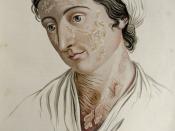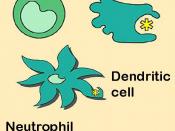Notes
The skin provides the first defense against invasion by pathogens. Skin acts as a wall that keeps pathogens out of the body. Secretions of the oil and sweat glands within the dermis make the skin's surface very acidic, inhibiting the growth of many pathogens. Sweat also contains the enzyme lysozyme, which attacks and digests the cell walls of many bacteria.
Internal surfaces of the body though which pathogens could pass are covered by mucous membranes, epithelial layers that produce the sticky fluid called mucus. Mucous membranes line the digestive system, nasal passages, lungs, respiratory passages, and reproductive tract. Mucous membranes not only serve as a barrier to pathogens, but also produce chemical defenses. Cells lining the bronchi and bronchioles in the respiratory tract secrete a layer of sticky mucus that traps microorganisms before they can reach the warm, moist lungs, which are ideal breeding grounds for microbes. Cilia on the cells of the respiratory tract continually sweep the mucus upward so that it can be swallowed, sending potential invaders to the stomach, where they are destroyed by acid.
The surface defenses of your body are very effective, but can occasionally be penetrated. You can take pathogens into your body when you eat and breathe. They can also enter through wounds or open sores. This is when the second line of defense comes in.
The most important of the counterattacks against infection are those carried out by cells that attack invading microbes. These cells patrol the bloodstream and wait within the tissues for invaders. There are three kinds of these cells.
1.MacrophagesWhite blood cells called macrophages kill bacteria one at a time by ingesting them. Most of the macrophages travel throughout the body in the blood, lymph, and fluid between cells.
2. NeutrophilsWhite blood cells called neutrophils sacrifice...



Biology
Insightful, informative, detailed, flows smoothly and is well structured. A great research resource.
Great Job, ccmustangs2001.
1 out of 1 people found this comment useful.